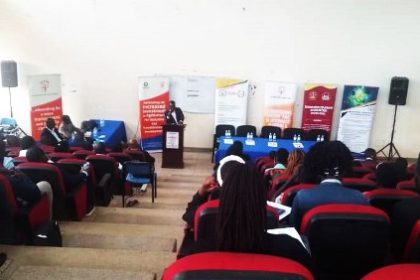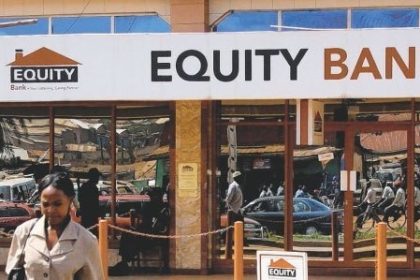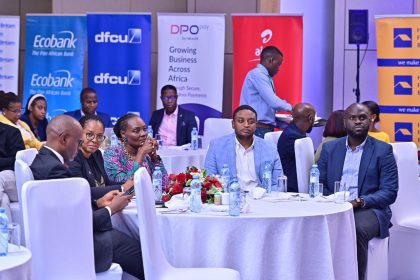Talking Telecoms’ with MTN Uganda’s Brian Gouldie

 At first sight, MTN Uganda CEO Brian Gouldie comes across more as a tech geek than the executive head of the leading team in Uganda’s eight-horse telecom market. That should perhaps not be surprising however, given where he sees the market going and, the fact that at any given moment, his Apple Iphone -6 series or the latest iteration of the Ipad, are within arm’s reach.
At first sight, MTN Uganda CEO Brian Gouldie comes across more as a tech geek than the executive head of the leading team in Uganda’s eight-horse telecom market. That should perhaps not be surprising however, given where he sees the market going and, the fact that at any given moment, his Apple Iphone -6 series or the latest iteration of the Ipad, are within arm’s reach.
In this interview with 256BN, he shares candid insights into the issues that still occupy the minds of industry leaders and what products are likely to define the future as competition deepens – excerpts.
Some sections of the telecom industry are showing signs of stress and when you compare the number of people who own a phone in Uganda to the population above 16, one could argue that we are close to 100 percent penetration. Has the market reached maturity?
If you look at SIM penetration, it does indicate that the addressable market older than 16 has been addressed. So I think from the voice perspective the telecommunications market is reaching maturity. Over the last 15 years, there has been fantastic growth in voice and a lot of people have got access to telecommunications. You have coverage that reaches 95 per cent of Uganda’s land mass and certainly MTN contributes substantially to that because we like to think we are a national operator. But for me the opportunity that still exists is with respect to data because when one does an analysis on data penetration, what we find is that penetration is as low as 7 percent. And when I talk about 7 percent, that penetration percentage is a function of our own base. And I think the reality is that where the world is going from a digitization perspective, I would bet that a lot of people are utilizing voice and not many people are utilizing data. Some time ago the team ran a direct campaign and every single month we were giving every single one of our customers 15 megabytes of free data. What we found was that 60 percent of the people that we gave the free data did not use it. Now the question would be why? Of the 40 percent that is left, 20 percent have used the data incidentally and of the remaining 20 percent, 7 percent are the people we know are using this data while the 13 percent have activated data settings. So we essentially have a 20 percent penetration of which 7 percent is 3G penetration and 13per cent is 2G data penetration. The reality is, that is quite low.
One of the things one notices is that while the cost of voice has been falling, data rates have remained pretty much in the same position for years. Would a reduction in price result in more data usage?
The answer would be yes because generally price is a barrier. One of the interesting things that we are being told by the research is that there are reasons besides price that are preventing people from accessing data. When you actually start to break it down it could be at the device level because most of the phones have not been configured for data. There is a whole lot of customers that use very low end 2G devices in the range of $10-15 dollars but the automatic data configuration haven’t been done.
What is the limitation of 2G or what can you get with 2G that you cannot get from other forms of data?
You can get voice and data on 2G and the only difference is that the speeds are too slow. Once you are configured for data the experience a customer will have on 2G is fundamentally different compared to 3G. But in the context of a maturing market for voice the opportunity is in data. So what you find is that there is a substitution generally of data for voice like SMS. What we find is that SMS also is sort of maturing as it spreads out because a lot of data applications are now substituting it so you now don’t see any growth in SMS anymore because a lot of data and social media applications are substituting it. So what we actually have is that you have got a typical competing bearer and the data bearer is substituting the voice bearer. What we generally do is to sort of look at voice and data together so as voice is maturing, data is growing at about 40 to 50 percent year on year.
We see heavy discounting in the voice segment. What does this translate into in terms of revenue streams and how sustainable is the current market situation?
My assessment of the market from a competitive perspective is about size of investment. Your ability to sustain competition and low price is often a function of two things: One is you have to invest in the network and you have to have a very effective on-net base. The challenge for every one of us is that Uganda is one of the most competitive markets in every aspect. Eight licenses for a country with a total addressable market of 37 million is quite a lot. The moral of the story is that issuing licenses does not result into competition if the license does not result in investment in a network which can create sustainability of quality of service that the regulator wants which then supports a viable process in terms of having a return on investments. What we then see is short term strategies that actually work against the operator and I think it has certainly repeated itself and at the end of the day the customer does not always necessarily benefit from that. The customer is looking for a sense of value at a reasonable price with a coordinated quality and ultimately those two things have to be in play for a sustainable period. There is this historical trend of low pricing and the market adjusts and you have operators fall-out because they are just not able to sustain that level of competition and also sustain some degree of investment because they are not getting any revenue.
We saw a tendency towards consolidation a couple of years ago when Airtel absorbed Warid Telecom. Considering the present configuration, do you believe we are likely to see further consolidation or we are likely to see another player coming in?
For me consolidation makes the more sense whether we see it or not and it is likely to happen simply because a market of this size cannot support the present number of operators. I am of the view that we should perhaps have a market of maybe four operators. I come from South Africa, we also work in Nigeria and Nigeria has got a massive population but has only five operators. South Africa has got only three so its operators are quite sustainable because ultimately when you invest millions of dollars you want to have a return on the investment and one thing that the regulators have to understand is the balance between investments which create sustainability and a degree of certainty.
Because MTN finds itself in the leading position, we continue to invest and I think because we have created our own certainty, we continue to be the biggest investor where other operators are hesitant. So MTN has been able to improve and sustain its good quality of services through various propositions like voice bundles and the current reports show that we have had the most improvement in quality delivery to our customers. We are also investing in 3G and 4G technologies which show growth in data.
A while ago, your mobile money product put you in the news for the wrong reasons but what role has mobile money played in promoting financial inclusion- are you likely to go into banking products the way your stablemate Safaricom has done across the border in Kenya?
That is exactly the strategy and I think Mpesa is a very good example of what a mobile money product can achieve and certainly it’s in MTN Uganda’s ambition to mimic if not to better Mpesa in the longer term. Provision of basic financial services was the first part of our strategy in terms of money transfer and payments but international remittance, savings products and one day hopefully lending products, will certainly be next on our agenda. I think it certainly creates a very important financial services sector. One thing about the money transfer product is that in order for us one day to move into the digital world we actually have to have the financial services to facilitate the payment for content. The reality is that a financial services platform also allows for digital content to be acquired by customers. So the mobile money platform has actually got two key strategic roles; one is financial inclusion which allows for money to be transferred conveniently and also allow for airtime to be conveniently purchased. But as the digital world starts to evolve, in order for customers to acquire content one of the ways is to offer digital financial services. So as we predict the evolution of the financial services sector in the next two to three years the question is whether that is going to come out of the banking sector or telecom sector. I think both sectors are going into a serious competition with each other.
Do you find the financial sector regulator proactive in supporting the evolution of these services?
I think financial sector regulators are generally conservative but if you look at the success of mobile money in terms of the money transfer products (MTN mobile money has done extremely very well since 2008 when we launched), it has been seven years down the line and the penetration levels are very good. Actually in the MTN group, Uganda’s mobile money product is leading all operations and we are operating in 22 countries throughout Africa and the Middle East. In some respects the product has been very successful but I don’t think everyone appreciates how successful that has been in terms of financial inclusion. We have got more than 7.7 million registered Mobile Money subscribers of which 3.5 million are active in a 30 day period. One of the challenges we have is that the registration process cuts out some people who would want to register in the more remote areas. It’s quite unfortunate that there is no access to electricity and the registration process in the remote areas is so difficult and it is affecting further penetration. There are a million people who want to register but we can’t reach them. Now we are working quite aggressively to address that in terms of how do we overcome that? But it shows you that the size of the mobile money opportunities is even bigger. The fact that there has been no national ID system is also part of our constraints because registration would be much easier if we just had to validate somebody against a centralized ID system so we have to compensate for a lack of it. If it wasn’t for that you would even have greater penetration. I however, predict that the evolution of mobile money will move into banking products. We have already asked for approval from the Bank of Uganda to launch a banking product and an international remittances product for cross border transfers which is actually very expensive at the moment.
The issues surrounding mobile money have brought security to the fore. As the industry moves ahead how secure will customers’ data and deposits be?
One of the things that MTN stands for is reliability, consistence and trust. What I think customers are wanting to associate with is a brand where you feel your money is secure and what I think is unfortunate about the recent press is that there was a fraud that was committed internally within MTN in 2011 and that case is current in court; the director of public prosecutions is taking people that have previously been employed by MTN to the anti-corruption court which I think is very positive because it is sending out a message that says corruption in Uganda will be prosecuted. What is probably not coming out is that at no time was a customer’s money jeopardized. We started a process in 2014 where we now have customer transaction ID so there is an ongoing improvement of how the system works and at a customer level that is credible.
A couple of years ago we saw the industry shed non-core assets with everybody selling off their towers. What benefits have accrued from this rationalisation?
As the industry matures what was once a strategic differentiator ceases to be as everybody gets some coverage capacity. As the price of voice comes down you need to bring cost down. What we are learning as MTN group is that a tower company has some substantial benefits for MTN that creates cost optimization. You have people who are focused on the cost management of sites and because you have multiple locations that means that more than one operator can share a site so you are sharing the rental cost. That in itself creates incentives for the tower company to get on to the grid rather than rely on diesel generators. In the longer term an integrated tower company management structure has a big impact on reducing cost within an operator. As cost and price come down, it has allowed for optimization that provides viability of operations in the long term.

 Shell Club rewards first winners with brand new motorbikes in Mbale
Shell Club rewards first winners with brand new motorbikes in Mbale
 CSBAG roots for increased funding for renewable energy
CSBAG roots for increased funding for renewable energy
 Equity walks tried and tested path to deliver solid half-year
Equity walks tried and tested path to deliver solid half-year
 Nile Breweries primes retailers for brave new world
Nile Breweries primes retailers for brave new world
 Uganda calls for collaboration with airlines in fight against illicit trade in wildlife
Uganda calls for collaboration with airlines in fight against illicit trade in wildlife
 Airline industry top guns dust-off passports for Uganda hosted 55th AFRAA annual meet
Airline industry top guns dust-off passports for Uganda hosted 55th AFRAA annual meet
